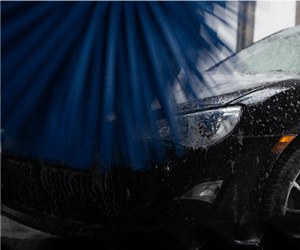
Tech Through The Ages
January 1, 2017
7 minute ReadIn terms of technology, it’s safe to say you ain’t seen nothin’ yet.
Mobile commerce. 3-D printing. A flying warehouse equipped with a fleet of delivery drones. Automatic cars. Virtual reality.
Despite the dizzying onslaught of disruptive developments in recent years, get this: The Emerging Future, a Miami-based consulting firm that focuses on new paradigms, noted that the amount of technological advancement that occurred in the year 2000 occurred every one hour and six minutes in 2013 — and by 2020, will occur every 30 seconds.
Change is not only inevitable; it’s also rapidly accelerating. So, too, are the expectations of the customer. Across industries, good enough is no longer good enough. Consumers increasingly expect a seamless, easy, fast and pleasant experience — and technology is often the vehicle that can deliver it.
“I don’t feel that a car wash or any other service business like that would be immune to the changing expectations shaped by technology,” said customer experience expert and Watermark Consulting founder Jon Picoult. He gives the example of being able to schedule an appointment for a barber using his mobile phone. “I can’t say that it was anything I ever thought about as a customer that I wanted from a barber,” he said. “But now that it exists, it’s a great convenience.”
Likewise, a busy car wash that allows scheduling in advance, ties in to weather system technology or allows people to pay with their mobile phones offers added relevance.
“The fact is, as consumers start to see innovations in other industries, it does start to shape their expectations,” he said. “Once you order from Amazon with a one-click purchase and see the string of emails every step of the way as it’s delivered, eventually you start to wonder about that when dealing with another company in another industry.”
A Chasm of Perception
Before we take a look ahead, a step back might be in order. The idea of a good “customer experience,” sometimes called CX, is that the consumer’s expectations are met at every point he or she connects with a company, whether directly or indirectly. That requires consistency in service and message, as well that customer having a sense of being understood. The challenge is that, even though customer experience has become a buzzword across industries in recent years, there’s still a disconnect between how companies try to achieve it and what actually comes across. Picoult points to a study from management consulting firm Bain & Company in which 80 percent of business executives believed they were delivering a superior customer experience — but only 8 percent of their customers agreed.
“That chasm of perception is not unusual,” he said. “The surprise is that, to this day, we see a lot of companies brainstorming some new type of experience or way to interact with the consumer, and everybody in the room is on the payroll of that company. If you want to be customer-centric, you need to have customers in that discussion.”
Picoult also is a proponent of observing customers in their natural habitat, including when they use technology; when those customers take part in surveys or questionnaires, they may not mention things they’d like to see changed. “But those are often the things that lead to the most brilliant innovations.”
Over the years, car washes have been through numerous technological innovations, not only involving payment systems and robotics but also the colors, textures and scents of the various soaps and foams.
Less obvious, however, is the way that technology has developed to help car washes handle everything from a compact to a Hummer.
David Gauthier, chief engineer, Mark VII Equipment, has seen a lot of changes since he started working in the field in 1976. One of the most significant, he said, was the move from traditional mechanical drum switches to microcontrollers, allowing for different sequences and functions.
“We take it for granted that we can look at a dishwasher and have it tell us that it has 10 minutes to go,” Gauthier said. “But it wasn’t until the advent of the microcontroller that we could do those kinds of predictive pieces. Every car is a different length or shape, and it wasn’t able to predict when the end of the wash would actually occur.”
More recently, he said, the connectivity of the Internet of Things has helped the various pieces of the car wash share data with each other, such as the temperature, entry system operation and soap tank levels. Robotics have become more precise. Rollovers have become much more forgiving to vehicle surfaces. Cars are now washed using the least amount of water and energy possible. And the very latest in technology — a point of growth for the future — relates to predictive maintenance and better use of data.
All told, it adds up to a much better customer experience.
Interestingly, the ideal customer experience is different in North America than it is in Europe, Gauthier said. According to Gauthier, everyone is interested in a clean car, but North Americans are more interested in the entertainment value of lights and colors to go along with it, and want it all to happen quickly. In Europe, it’s more of an investment in time and money; a car wash may cost $25-30. The technology is focused more on precision and a “top-end product,” no matter how long it takes.
Bright and Shiny
Granted, there are endless ways car wash owners can move forward with technology, and like leaders in any industry, they can be stymied about which choices will be most relevant and beneficial to the business. Picoult admits there are no easy answers when it comes to the line between what will affect the bottom line and what’s simply exciting and new.
“It’s a judgment every business leader needs to make on a continual basis,” he said. “It’s easy to get drunk on the technology and start to deploy technology for technology’s sake, because it’s the next bright, shiny object that excites people. But it’s important for businesses to temper that excitement… with an understanding of your customer’s needs, and what the key moments of truth are in their interactions with you. You want to make sure you’re applying technology in those areas that matter most. And the way you reveal that, in part, is by stepping into your customer’s shoes.”
Read Hauck, owner of Camel Express Car Wash in Nashville, Tennessee, stepped into his customer’s shoes long ago without even realizing it was happening. As a kid, he said, he was “deathly afraid” of car washes. And now that he has a one and a half-year-old son of his own, he has designed a space that is anything but scary.
For Hauck, incorporating the latest in technology has meant the use of LED neon flex lights with a central DMX controller to create a fun, variable, exciting ambience; vacuum canopies with a futuristic feel; high-tech pay stations with mobile pay options; RFID tags for loyalty members that automatically open gates; and sonars that profile the contour of various vehicles and help adjust the wash accordingly.
“And there’s one thing that we’ve just started doing that has had tons of excellent reviews,” he said. “If a customer checks in on Facebook while at the car wash, they immediately receive a link for a free car wash in their inbox. All they have to do is scan their barcode at the pay station.” In addition, when a customer checks in and receives a coupon, that customer can opt into Apple’s Passbook for geo-fencing technology that will send a reminder about the car wash to the customer’s phone anytime he or she is nearby, automatically pulling up available coupons.
“Our main purpose at this car wash, every single day, with every single employee, is to enrich the customer experience,” said Hauck, who credits much of the wash’s technology to a “flawless” partnership with DRB Systems. “If we put money back into the car wash, and invest in technology that enriches that customer experience, we’ll be a lot better off down the road. We can make things simple for the customer, and simple is better.”
So far, his thinking is paying off; though Camel Express just opened in 2016, Hauck has put an offer on land for a second location.
Understanding Stagecraft
With the rate of change as it is, what happens tomorrow — in car washes and elsewhere — is anyone’s guess.
One thing is certain: Technology, especially mobile technology, has placed a greater emphasis on the need for immediacy in interaction and response, Picoult said. New technologies will continue to create fresh pathways of interaction and seamless experiences, in addition to increasing customer expectations.
The days of just offering a clean car may well be behind us. But the days ahead will, if nothing else, be exciting for companies and customers alike.
Because car washes are direct service providers, it may be easier for owners to understand the value of good customer experience — and how technology really can make a difference.
Compared to other industries, Picoult said, “You see the customer a lot more frequently. You talk to them. You interact with them. It’s a very different dynamic than when a person is buying a packaged good, and after they buy it, the company basically never hears from them again.”
That said, a caveat: Technology alone can’t do the trick. Picoult’s most meaningful car wash experiences have involved an attendant who drew a cartoon character on the window, delighting the kids in the car pre-wash, and another attendant who snapped a drying towel with a bit of theatrics before placing it on the ground by the driver’s side door, keeping Picoult from entering the car with dirty feet.
“Those things had nothing to do with technology,” he said. “But they were great examples of service organizations understanding stagecraft in delivering a memorable experience.”
It’s still essential to nail the fundamentals, Picoult said — regardless of what other whiz-bang tech is involved.








